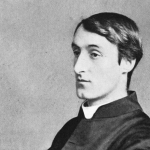Barely tolerated, living on the margin
In our technological society, we were always having to be rescued
On the brink of destruction, like heroines in Orlando Furioso
Before it was time to start all over again.
There would be thunder in the bushes, a rustling of coils,
And Angelica, in the Ingres painting, was considering
The colorful but small monster near her toe, as though wondering whether forgetting
The whole thing might not, in the end, be the only solution.
And then there always came a time when
happy Hooligan in his rusted green automobile
Came plowing down the course, just to make sure everything was O.K.,
Only by that time we were in another chapter and confused
About how to receive this latest piece of information.
Was it information? Weren’t we rather acting this out
For someone else’s benefit, thoughts in a mind
With room enough and to spare for our little problems (so they began to seem),
Our daily quandary about food and the rent and bills to be paid?
To reduce all this to a small variant,
To step free at last, minuscule on the gigantic plateau—
This was our ambition: to be small and clear and free.
Alas, the summer’s energy wanes quickly,
A moment and it is gone. And no longer
May we make the necessary arrangements, simple as they are.
Now there is no question even of that, but only
Of holding on to the hard earth so as not to get thrown off,
With an occasional dream, a vision: a robin flies across
The upper corner of the window, you brush your hair away
And cannot quite see, or a wound will flash
Against the sweet faces of the others, something like:
This is what you wanted to hear, so why
Did you think of listening to something else? We are all talkers
It is true, but underneath the talk lies
The moving and not wanting to be moved, the loose
Meaning, untidy and simple like a threshing floor.
These then were some hazards of the course,
Yet though we knew the course was hazards and nothing else
It was still a shock when, almost a quarter of a century later,
The clarity of the rules dawned on you for the first time.
They were the players, and we who had struggled at the game
Were merely spectators, though subject to its vicissitudes
And moving with it out of the tearful stadium, borne on shoulders, at last.
night after night this message returns, repeated
In the flickering bulbs of the sky, raised past us, taken away from us,
Yet ours over and over until the end that is past truth,
The being of our sentences, in the climate that fostered them,
Not ours to own, like a book, but to be with, and sometimes
To be without, alone and desperate.
But the fantasy makes it ours, a kind of fence-sitting
Raised to the level of an esthetic ideal. These were moments, years,
Solid with reality, faces, namable events, kisses, heroic acts,
But like the friendly beginning of a geometrical progression
Not too reassuring, as though meaning could be cast aside some day
When it had been outgrown. Better, you said, to stay cowering
Like this in the early lessons, since the promise of learning
Is a delusion, and I agreed, adding that
Tomorrow would alter the sense of what had already been learned,
That the learning process is extended in this way, so that from this standpoint
None of us ever graduates from college,
For time is an emulsion, and probably thinking not to grow up
Is the brightest kind of maturity for us, right now at any rate.
And you see, both of us were right, though nothing
Has somehow come to nothing; the avatars
Of our conforming to the rules and living
Around the home have made—well, in a sense, “good citizens” of us,
Brushing the teeth and all that, and learning to accept
The charity of the hard moments as they are doled out,
For this is action, this not being sure, this careless
Preparing, sowing the seeds crooked in the furrow,
Making ready to forget, and always coming back
To the mooring of starting out, that day so long ago.
















Comment form: